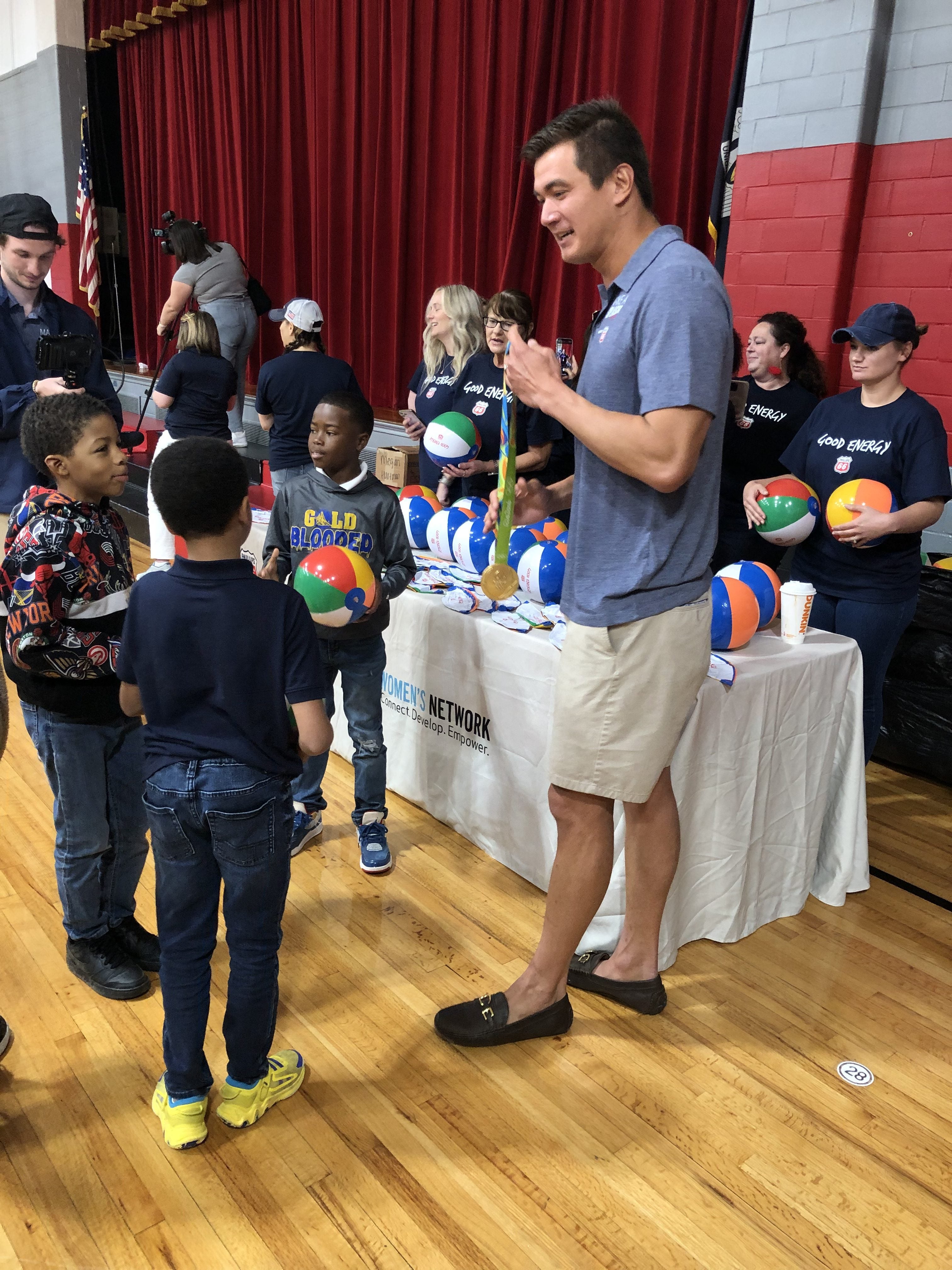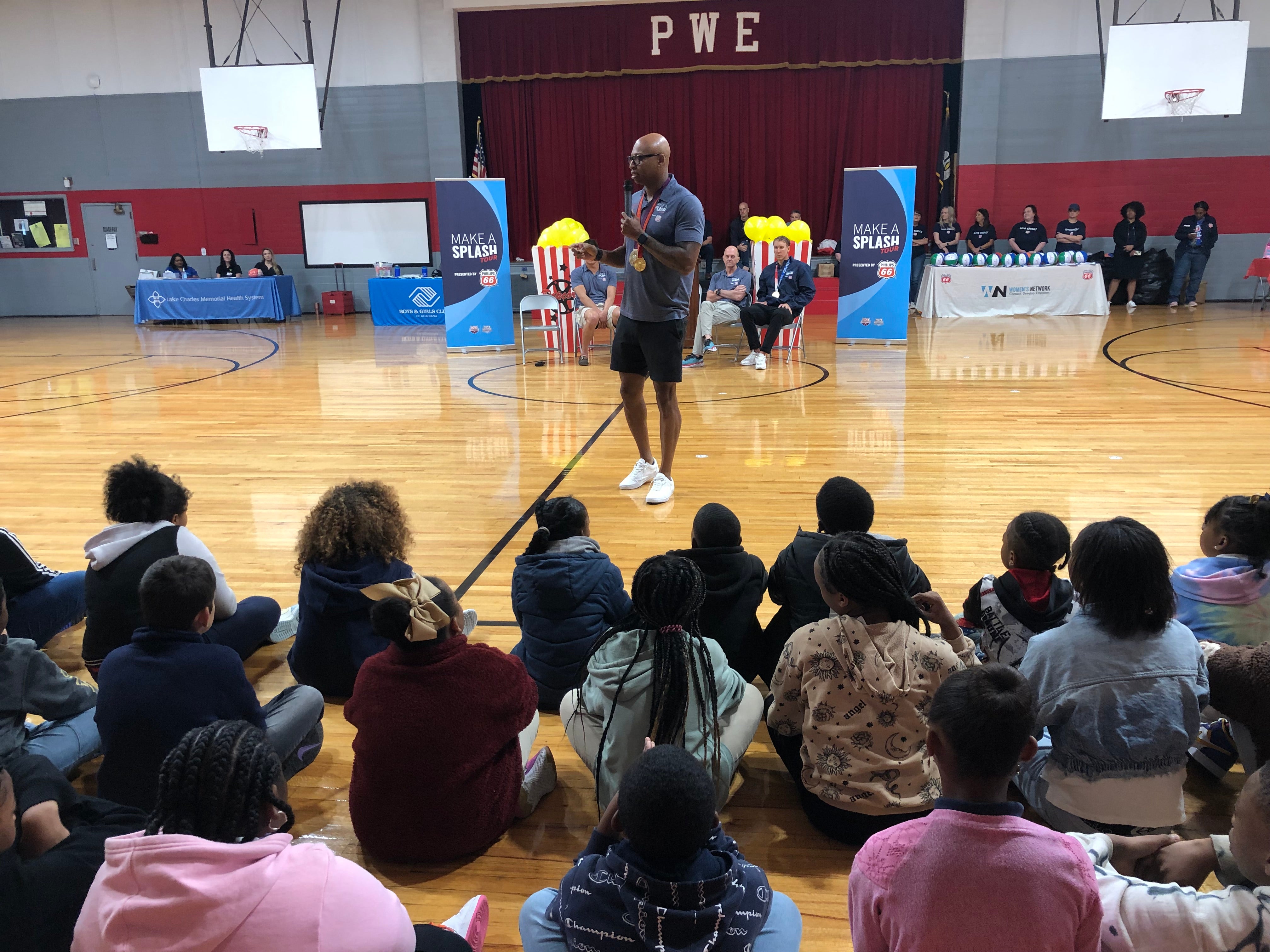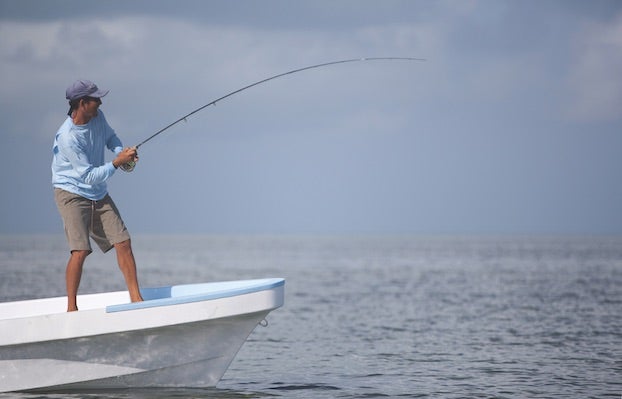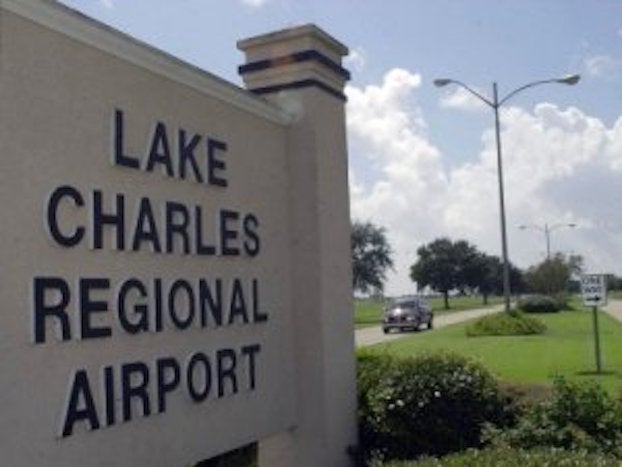Making a splash: Olympic gold medalist swimmers visit SW La.
Published 2:34 am Saturday, May 6, 2023
Four Olympic gold medalists — Nathan Adrian, Rowdy Gaines, Cullen Jones and Chase Kalisz — made a stop in Lake Charles during the 2023 Make-a-Splash Tour.
They made two stops on Friday, May 5. In the morning, they visited the students at Pearl Watson Elementary, where they talked to students about the four best steps they can take to stay safe while swimming.
These steps are Learn to swim, bring an adult and/or friend and reach or throw, don’t go (don’t jump in the water to help someone that is drowning. Instead reach out to grab them or throw them something to hold onto in the water).
That afternoon, they visited Sulphur Parks and Recreation, where they provided swimming instruction to around 50 local children.
Lake Charles was the second stop on their tour. Earlier in the week, they spoke to students in Houston. Later in the month, they will be visiting St. Louis, Roxana, Illinois and Billings, Montana.
This tour is hosted by the USA Swimming Foundation, the philanthropic arm of USA swimming and U.S. Masters Swimming, in partnership with Phillips 66. The mission of this foundation is to give every person a chance to learn to swim.
The Olympians, and those at the USA Swimming Foundation, believe that teaching kids to swim should be a part of their foundational development.
“They love being near water, so we want the parents to understand the importance of getting their kids to learn to swim in their development: learn to walk, learn to talk, learn to swim. This is a life saving skill,” said Jones.
Adrian, eight-time Olympic medalist (five of those being gold), spreading awareness about how the lack of children in swimming lessons is imperative, especially for parents of small children. “As a parents, you just automatically assume that all parents know and understand the importance of swim lessons, but actually when you boil it down, they don’t.”
In fact, a significant population of parents don’t know that teaching children to swim is imperative. This is a common, but dangerous, ideology, Jones said. “We need to change that perception.”
Jones — a four-time olympic medalist that has held the world record for the 4×100-meter freestyle relay for 15 years — is the first African-American swimmer to hold a world record, and for him, teaching children water safety is personal. At age 5, he nearly drowned after going down a slide in an inflatable tube at a waterpark. His parents enrolled him in classes just a week later.
According to the USA Swimming Foundation, drowning is the leading cause of unintentional death for children ages 1 through 4 and the second-leading cause for children under 14.
“Drowning is an epidemic in our country… water is like a magnet to kids,” said Gaines, U.S. Olympic Hall of Fame and International Swimming Hall of Fame member and three-time Olympic gold medalist.
He explained how quickly children can succumb to drowning. “Eight seconds. That is as long as it takes to check a text or going to answer the door or change the laundry.”
“There is no screaming, it is silent. It is completely silent, and it can happen so quickly,” added Adrian.
Formal swimming lessons can reduce the likelihood of childhood drowning by 88 percent, but children with parents that don’t know how to swim only have a 19 percent chance of learning in their lifetime. “That’s a cycle that we’re here trying to break. We want these kids to go home and start begging for swim lessons.”
Kalisz, who has earned one Olympic silver medal and one Olympic gold medal, expressed that reducing preventable deaths is the mission that binds them together. “The life saving component is ultimately why we’re all here.”
While these issues span various demographics, awareness is essential in underserved communities.
Currently, 64 percent of Black Americans, 54 percent of Hispanic and Latino children and 38 percent of Caucasian children have little to no swimming ability, Jones said. “It’s a problem across the board.”
Additionally, in families with a household income less than $50,000, nearly four out of five children are not strong swimmers, or swimmers at all.
He said that when Make-a-Splash was created, 70 percent of Black Americans didn’t know how to swim. “We saw the numbers go down, which is great, because when we started this, we definitely didn’t expect it to be in our lifetime that we would see these numbers drop.”
Supporting swimming ability in children in these communities is not only life-saving, it can dismantle barriers for athletes for minority groups. “Breaking stereotypes is something that we are doing every day in the sport of swimming. We all know that swimming is a white dominated sport,” said Jones. “To be the first African American to have a long course world record… still I pinch myself today… but it’s not done.”
He referenced Simone Manuel, the first African American woman to win a gold medal in an individual swimming event. “To see all these young swimmers that are coming into the sport… to see that trend already happening, it’s amazing.”
Passing on the love for swimming is a mission of all the Olympians. “For us, water is part of the fabric of who we are… it’s the passion of our lives on the competitive side, but also on the swim side… it think for all of us it is really important,” said Gaines.
Kalisz, who is currently training for the 2024 Olympics in Paris, aims to motivate young people to pursue competitive swimming. “If we can also connect with these kids on another level, foster appreciation for the sport itself and bring others into the sport, that gives so much back to us.”
Community outreach is paramount. Make-a-Splash regularly partners with communities, local partners daily, said Jones. “The work is being done in the communities. It’s not perfect but we’re getting there.”
The foundation provides Community Impact Grants, which financially support historically impoverished and racially diverse swim clubs. Last year, 22 clubs and five historically black colleges and universities received $210,000 in funding.
Since its founding in 2004, the foundation has invested $5.8 million in Learn-to-Swim grants, $7.5 million in water safety awareness and $7.4 million in Building Champions, which provides funding for athletes, teams and athletic programming.
USA Swimming has also invested $8.6 million in education, water safety materials and training for over 1200 swim lessons providers.
a
To learn more about the foundation or to find a local swimming lesson provider, visit www.usaswimming.org/foundation.







